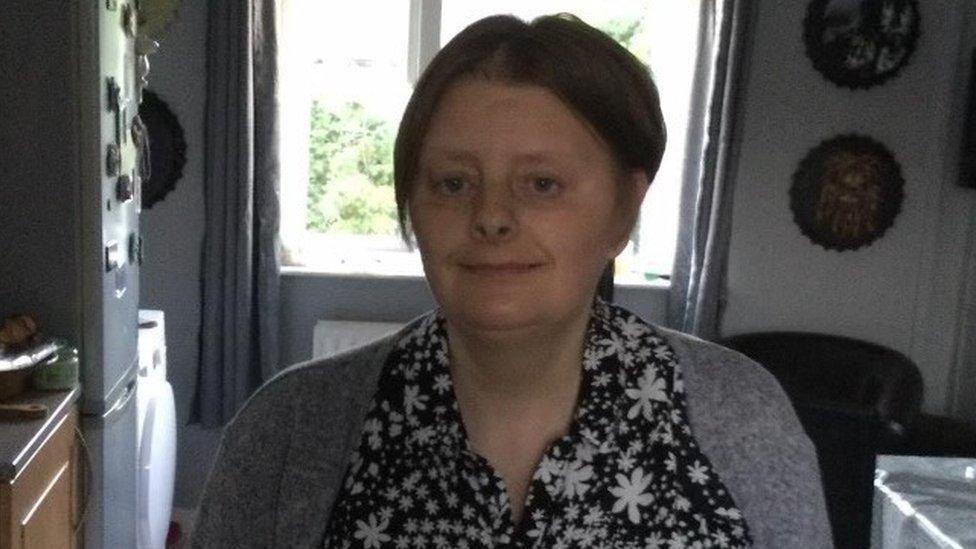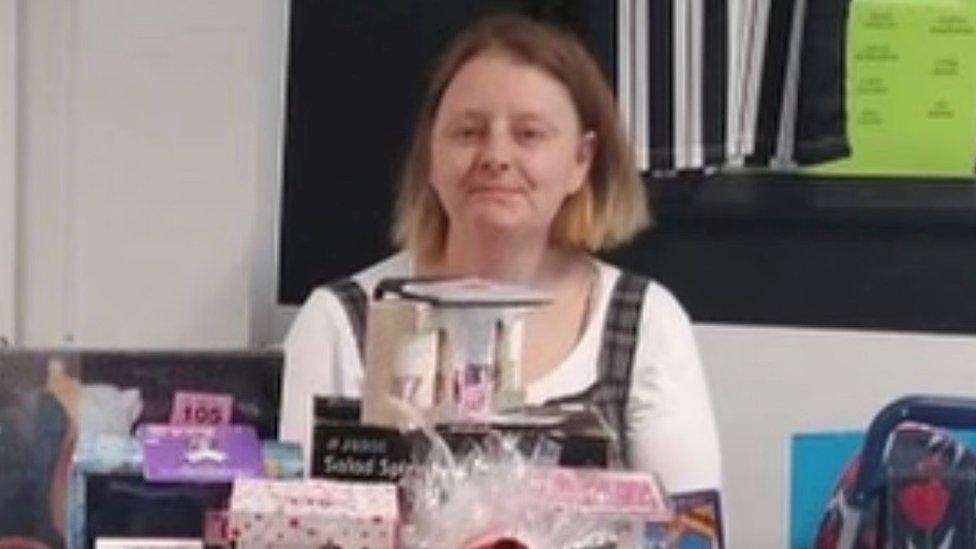Ferryhill woman died after being deemed low-risk by NHS
- Published

Linda Banks had frequently made contact with the mental health crisis team before she took a fatal overdose.
A woman took a fatal overdose after being deemed low-risk by an NHS mental health crisis team, a coroner heard.
Linda Banks, 48, died in hospital a day after being found at her home in Ferryhill near Durham in April 2022.
She made multiple calls to the Tees, Esk and Wear Valley NHS Trust in the weeks before her death, with her doctor and family also raising concerns.
Assistant coroner Janine Richards said she would consider if any "failings" played a part in Ms Banks's death.
The inquest, in Crook, heard a friend had raised the alarm on 9 April after she was unable to get into Ms Banks's house
Police had to force entry into her Ferryhill home, which ambulance staff observed to be "very cluttered and very cold". Ms Banks told them she had not eaten for seven days.
She was taken to hospital, but died the following afternoon, with her cause of death given as a drug overdose with alcohol misuse.
'Minimal risk'
Her brother, Jonathan, told hospital staff she had been "suffering" since the death of their mother the previous November, and he had seen a "significant deterioration" in the weeks before his sister's death.
The inquest heard Ms Banks, who had a history of mental illness, was grieving the loss of her mother, stressed about issues involving her disability benefit, and struggling to reduce her alcohol dependency.
She had called the NHS Trust's crisis team five times over two days in February 2022, during which she went from being in an "anxious state" to discussing self-harm, to inflicting a "superficial" cut on her arm, before finally going to Accident & Emergency after taking an overdose.
The crisis team was in special measures at the time, with low staff numbers available to cope with a high volume of cases.
Every time Ms Banks made contact, she was put in touch with a support worker rather than a registered mental health professional, the inquest heard.
Eventually Ms Banks was given a face-to-face assessment by clinician Jayne Bennett on 20 February, who found the patient to be at "low" or "minimal risk" of self-harm.

Linda Banks died in April 2022
Ms Bennett said a cut - which Ms Banks said was self-inflicted, using a razor - did not look like a fresh injury; she noted the patient was crying but not shedding tears; nor was there was any sign of psychosis.
A plan was drawn up proposing Ms Banks sought bereavement counselling, and would be given support with any benefit claims, as well as help with her alcohol dependency issues.
Ms Bennett concluded her assessment, advising Ms Banks that if she felt upset, she should contact the crisis team again.
The following morning Ms Banks's partner called the team at the Trust to say Linda was talking about harming herself. He was advised to speak to her GP, who then told Ms Banks to contact the crisis team - which she did.
In March, her GP made a referral to the Trust saying Ms Banks had become erratic, with severe paranoia and agitation.
Social media
Her brother also called the crisis team to report his sister's "bizarre" behaviour, while the financial team at Home Group - who were supporting Ms Banks with her benefits claim - also contacted the crisis team to raise concerns.
Her family also made a number of calls to say she was not eating or drinking, and her home was in "disarray", the inquest heard.
Ms Bennett carried out a second face-to-face assessment on 4 April but said Ms Banks, who had reported hearing voices, was not presenting as an "imminent risk to self" or presenting with psychosis.
She said Ms Banks's home appeared to be in a better state than it had been in February, and there was evidence she was feeding herself properly.
Ms Bennett said a major source of Ms Banks's distress was her use of Facebook and social media, so Ms Bennett suggested that by reducing her use, Ms Banks could reduce her anxieties - which, she said, seemed to "calm" and settle the patient.
Under questioning by Lily Lewis, representing Ms Banks's family, Ms Bennett accepted there were contacts with the team made by Ms Banks which were not recorded in notes.
'Under-estimation of risk'
Ms Banks's family said she was vulnerable because of having learning difficulties, but the inquest heard there was no record of that on any of her medical notes.
A serious incident review found there was an "under-estimation of risk", and there was a suggestion Ms Banks was not seen as being in "genuine" need of mental health help, Ms Richards said.
Ms Bennett said she believed her assessments were "comprehensive" but accepted Ms Banks's care should have been escalated after some of the calls.
Ms Richards said she would consider Ms Banks's mental healthcare and treatment between February and April 2022, and whether any "failings or missed opportunities" were "implicated in her death".
The assistant coroner previously found the Trust made errors in the case of another man, David Stevens, before he killed himself in June 2022.
The inquest continues.

Follow BBC Tees on Facebook, external, X (formerly Twitter), , externaland Instagram, external. Send your story ideas to northeastandcumbria@bbc.co.uk, external.